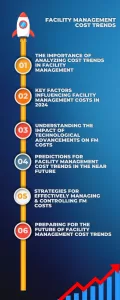1. Introduction to Facility Management Cost Trends
Facility management is a critical aspect of running a successful business, ensuring that the physical environment is in optimal condition for employees and customers. As we look ahead to 2024, it is crucial to analyze the cost trends and advancements that will shape the field of facility management. From integrated facility management services to the top companies in India, this comprehensive blog post will provide a detailed look at what’s in store for the future of facility management. Whether you’re in Mumbai or Bangalore, this article will equip you with the knowledge you need to navigate the ever-changing landscape of facility management services.
2. The importance of analyzing cost trends in facility management
In order to effectively manage a facility, it is essential to have a comprehensive understanding of the cost trends that are likely to shape the field in the coming years. By analyzing these trends, facility managers can make informed decisions about resource allocation and budgeting, ensuring that they are maximizing efficiency and minimizing expenses. Moreover, understanding cost trends can also help facility managers anticipate potential challenges and plan accordingly. Whether it’s the rising cost of maintenance materials or the increasing demand for sustainable practices, being aware of these trends will enable facility managers to proactively address issues and stay ahead of the curve.
3. Key factors influencing facility management costs in 2024
As we delve into the specific cost trends that will shape facility management in 2024, it is important to note the key factors that will heavily influence these costs. By understanding these factors, facility managers can better prepare themselves for the financial challenges that lie ahead.
One of the primary factors driving facility management costs in 2024 is advancements in technology. With the rapid pace of technological innovation, there will be a greater reliance on smart building systems, automation, and digital platforms. While these advancements offer increased efficiency and productivity, they also come with significant upfront costs for implementation and ongoing maintenance.
Another factor that will impact facility management costs is the growing demand for sustainable practices. As businesses and organizations strive to reduce their environmental footprint, facility managers will need to invest in eco-friendly initiatives such as energy-efficient systems and waste management programs. Although these investments may incur higher initial costs, they can lead to long-term savings through reduced energy consumption and regulatory compliance.
Additionally, labor costs will play a crucial role in shaping facility management expenses. With increasing minimum wage rates and a tighter job market, facility managers may face challenges in hiring and retaining skilled staff. This can lead to higher labor costs and potentially impact the overall budget for facility management.
4. Understanding the impact of technological advancements on facility management costs
Technological advancements continue to revolutionize the field of facility management, and in 2024, their impact on costs will be more significant than ever. Smart building systems, automation, and digital platforms offer immense potential for improving efficiency and productivity. However, they also come with substantial upfront costs for implementation and ongoing maintenance.
Facility managers must carefully assess the specific technological solutions that align with their organization’s needs. Investing in state-of-the-art technologies may yield considerable long-term savings, but it is crucial to weigh these potential benefits against the initial expenses. Additionally, facility managers should consider the potential for technological trends to become obsolete quickly, requiring continuous investment in upgrades.
Furthermore, adopting technology in facility management will require a skilled workforce capable of managing and maintaining these systems. Facility managers must prioritize training and development to ensure their staff possesses the necessary expertise to leverage technology effectively. Moreover, they must also consider potential increases in labor costs associated with recruiting and retaining skilled personnel.
5. Predictions for facility management cost trends in the near future
As we look ahead to the near future of facility management in 2024, several trends are expected to shape cost dynamics in this field. One of the most significant predictions is the rise of sustainable practices. As organizations continue to prioritize environmental responsibility, facility managers will need to invest in eco-friendly initiatives to reduce energy consumption and minimize waste. While implementing these practices may require upfront investments, they can lead to long-term financial benefits, including reduced utility costs and enhanced brand reputation.
Another trend to watch out for is the increased integration of data analytics and AI in facility management. Leveraging these technologies can provide valuable insights into energy usage, equipment performance, and occupant behavior, enabling facility managers to optimize operations and make data-driven decisions. However, with these advancements comes the need for skilled data analysts and AI specialists, which may contribute to an increase in labor costs.
Finally, it is expected that facility managers will need to allocate a proportionate budget for facility security. With the rise in cybersecurity threats, protecting sensitive data, infrastructure, and occupants is of paramount importance. Advanced security systems and protocols may necessitate additional expenses, but the potential consequences of a breach outweigh the initial costs.
6. Strategies for effectively managing and controlling facility management costs
Managing and controlling facility management costs is crucial for organizations seeking to optimize their operations and maximize financial success. By implementing effective strategies, facility managers can ensure that costs are controlled and kept within budget without compromising on quality and performance. Here are some key strategies to consider:
1. Conduct a comprehensive cost analysis: Start by gaining a clear understanding of your facility’s cost structure. Analyze expenses at both the macro and micro level, identifying areas where costs can be reduced or eliminated. This analysis will provide valuable insights into where resources are being allocated and where potential savings can be achieved.
2. Implement maintenance best practices: Maintenance costs can be a significant component of facility management expenses. By implementing proactive maintenance practices, such as regular inspections, preventive maintenance scheduling, and prompt repairs, facility managers can avoid costly breakdowns and extend the lifespan of equipment and facilities. This can lead to significant savings in the long run.
3. Invest in energy-efficient technologies: As energy costs continue to rise, investing in energy-efficient technologies can help reduce utility expenses. Consider upgrading lighting systems to LED, installing smart thermostats, and implementing energy management systems to monitor and control energy usage. These investments can result in substantial savings over time.
4. Optimize space utilization: Utilizing space efficiently can lead to substantial cost savings. Evaluate the current layout and configuration of your facility, and identify opportunities to repurpose or consolidate spaces. By optimizing the use of existing space, organizations can avoid unnecessary expenses associated with leasing or maintaining additional square footage.
5. Implement effective vendor management: Facility managers often rely on external vendors for services such as cleaning, maintenance, and security. Effective vendor management includes negotiating favorable contracts, monitoring vendor performance, and regularly reviewing service levels and pricing. By actively managing vendor relationships, facility managers can ensure that costs remain competitive and services are delivered to the expected standards.
6. Embrace technology and automation: Leveraging technology and automation can streamline facility management processes, reduce manual tasks, and improve operational efficiency. Consider implementing a computerized maintenance management system (CMMS) to automate work order management, track assets, and generate reports. This can help minimize labor costs and enhance productivity.
By adopting these strategies and actively managing facility management costs, organizations can achieve sustainable financial success while maintaining the highest standards of facility performance. In the next section, we will explore the impact of sustainable practices on facility management costs, providing insights into how organizations can integrate sustainability into their operations while controlling expenses. Stay tuned!
7. Conclusion: Preparing for the future of facility management cost trends
In conclusion, analyzing facility management cost trends and implementing effective strategies to control expenses is crucial for organizations looking to optimize their operations. By conducting a comprehensive cost analysis, implementing maintenance best practices, investing in energy-efficient technologies, optimizing space utilization, implementing effective vendor management, and embracing technology and automation, organizations can achieve sustainable financial success while maintaining facility performance. However, the future of facility management cost trends is constantly evolving.
SILA adopts a tech-driven approach, utilizing Robotics and IoT, Automated Compliance Management, and our proprietary technology (SILA Connect) to efficiently manage properties across India. As pioneers in technology within the facility management sector, SILA stands out as one of the best facility management service provider in India.
To delve deeper into our integrated facility management services, click here.
Industries We serve –
Commercial Offices & Buildings | Manufacturing & Heavy Industrial Facilities | Residential Complexes & Townships | Hotels & Campuses | Airports & Malls | IT Parks & Data Centers | Warehousing & Logistics Parks | Banks & Retail
Present in 125 cities –
Ahmedabad | Baroda | Bengaluru | Chennai | Bhubaneswar | Delhi | Gurugram | Noida | Kolkata | Hyderabad | Kochi | Mumbai | Pune & more
Get a free quote today, to reduce your facility management cost.
FAQs
1. What trends are shaping the future of Facility Management?
Trends like the Internet of Things (IoT) integration, artificial intelligence (AI) for predictive maintenance, sustainable practices, remote monitoring and management, and the adoption of cloud-based solutions are shaping the future landscape of FM.
2. How does outsourcing Facility Management lead to cost savings?
Facility Management proves to be cost-effective. Managing spaces in-house can incur significant expenses. However, outsourcing it not only reduces the time your staff spends overseeing facility operations but also results in long-term savings.
3. What is mechanized housekeeping?
Mechanized housekeeping refers to the use of machinery, equipment, and automated tools in performing various cleaning tasks and maintenance activities within a commercial or residential space. This approach involves the use of specialized cleaning equipment such as vacuum cleaners, floor scrubbers, polishers, steam cleaners, pressure washers, and robotic devices designed to automate or simplify cleaning processes.
4. How does Facility Management play a key role in an organization's success?
Facility Management (FM) plays a pivotal role in an organization’s success by contributing to various aspects that directly impact efficiency, productivity, and overall performance. FM ensures that the physical workspace, infrastructure, and systems are well-maintained, safe, and conducive to work. A properly managed facility promotes productivity among employees by providing a comfortable and efficient working environment.
About SILA -
A Real Estate platform driven by an entrepreneurial spirit.
Our businesses include Real Estate Services which offer Facility Management, Contracting Solutions and Real Estate Advisory. Our other business is Real Estate Development. We have a diverse client base in various sectors which include large Corporates, Real Estate Funds, Landowners and Developers.
Over the last decade, SILA has scaled efficiently, managing over 150 million square feet of assets, with over 20,000 employees pan India. The platform is backed by Norwest Venture Partners and Samara Capital Group in our Real Estate Services and Development arms, respectively.
SILA is one of the best facility management service provider in Mumbai, Bengaluru, Delhi, Chennai, Hyderabad, Pune & more.
SILA is among the top facility management companies in India, offering comprehensive property management services and housekeeping solutions. As a leading facilities management company, SILA provides tailored FM solutions, including housekeeping services in Mumbai. Leveraging our expertise, we ensure seamless property management for clients nationwide. Whether you require housekeeping agency support or specialized facility management solutions, SILA delivers excellence in every aspect of your property’s upkeep and maintenance.

Aniket Sheth
About Author -
The insightful content in this blog is curated by Aniket Sheth, our esteemed Senior Vice President of Operations. With an impressive professional journey spanning over 13 years, Aniket has held key positions at prestigious brands, showcasing his exceptional leadership skills.
Aniket’s educational background is marked by an MBA from Cornell University, which laid the foundation for his successful career. He began his professional journey at EY in New York, contributing significantly to enhancing and implementing engagements for Fortune 500 companies.
Aniket’s strategic acumen, proficiency in asset management, and forward-thinking innovation have been instrumental in helping companies streamline their operations and achieve substantial cost reductions. His wealth of experience brings a unique perspective to the world of facilities management, making his insights invaluable for businesses seeking operational excellence.



